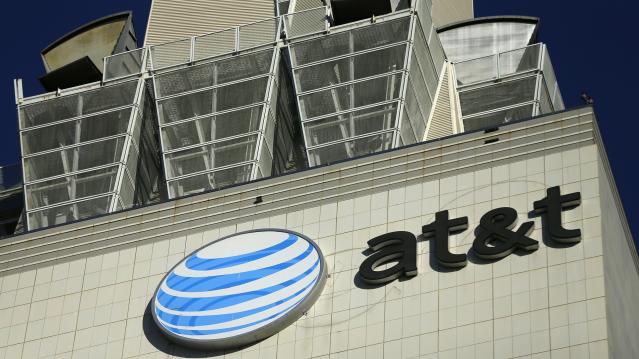FCC Slaps AT&T with $100 Million Fine for Throttling Internet Users

The FCC on Wednesday slapped AT&T hard, proposing a $100 million fine — the largest the agency has ever handed down — for what it described as the phone and broadband giant’s misleading customers about its “unlimited” data plans.
At issue is the practice of “throttling,” or limiting download and upload speeds for some users on those data plans.
Related: John Oliver Just Won the Net Neutrality Battle
AT&T’s throttling policy had been in place since 2011, according to an FCC statement, and it led to a barrage of complaints to the agency. AT&T targeted users who surpassed a certain data threshold over the course of a month, and consumer complaints argued that AT&T’s limiting of download speeds was directly at odds with the nature of the marketed “unlimited” plans.
AT&T, which is also pursuing government approval of its pending acquisition of DirecTV, says it will “vigorously dispute” the decision. In a statement, the company said that its practice is well documented and shared by many — if not all — service providers, and a legitimate method of managing their network’s resources. The FCC disagrees, claiming that AT&T violated transparency rules by falsely calling these plans unlimited.
"Broadband providers must be upfront and transparent about the services they provide,” said FCC Chair Tom Wheeler in a statement. “The FCC will not stand idly by while consumers are deceived by misleading marketing materials and insufficient disclosure."
Related: The Net Neutrality Debate Explained
AT&T has 30 days to respond before the FCC issues its final decision.
The Federal Trade Commission sued AT&T for $3.5 million in October last year, for the same alleged violation. That case is still ongoing.
Tweet of the Day: The Black Hole of Big Pharma

Billionaire John D. Arnold, a former energy trader and hedge fund manager turned philanthropist with a focus on health care, says Big Pharma appears to have a powerful hold on members of Congress.
Arnold pointed out that PhRMA, the main pharmaceutical industry lobbying group, had revenues of $459 million in 2018, and that total lobbying on behalf of the sector probably came to about $1 billion last year. “I guess $1 bil each year is an intractable force in our political system,” he concluded.
Warren’s Taxes Could Add Up to More Than 100%

The Wall Street Journal’s Richard Rubin says Elizabeth Warren’s proposed taxes could claim more than 100% of income for some wealthy investors. Here’s an example Rubin discussed Friday:
“Consider a billionaire with a $1,000 investment who earns a 6% return, or $60, received as a capital gain, dividend or interest. If all of Ms. Warren’s taxes are implemented, he could owe 58.2% of that, or $35 in federal tax. Plus, his entire investment would incur a 6% wealth tax, i.e., at least $60. The result: taxes as high as $95 on income of $60 for a combined tax rate of 158%.”
In Rubin’s back-of-the-envelope analysis, an investor worth $2 billion would need to achieve a return of more than 10% in order to see any net gain after taxes. Rubin notes that actual tax bills would likely vary considerably depending on things like location, rates of return, and as-yet-undefined policy details. But tax rates exceeding 100% would not be unusual, especially for billionaires.
Biden Proposes $1.3 Trillion Infrastructure Plan

Joe Biden on Thursday put out a $1.3 trillion infrastructure proposal. The 10-year “Plan to Invest in Middle Class Competitiveness” calls for investments to revitalize the nation’s roads, highways and bridges, speed the adoption of electric vehicles, launch a “second great railroad revolution” and make U.S. airports the best in the world.
“The infrastructure plan Joe Biden released Thursday morning is heavy on high-speed rail, transit, biking and other items that Barack Obama championed during his presidency — along with a complete lack of specifics on how he plans to pay for it all,” Politico’s Tanya Snyder wrote. Biden’s campaign site says that every cent of the $1.3 trillion would be paid for by reversing the 2017 corporate tax cuts, closing tax loopholes, cracking down on tax evasion and ending fossil-fuel subsidies.
Read more about Biden’s plan at Politico.
Number of the Day: 18 Million

There were 18 million military veterans in the United States in 2018, according to the Census Bureau. That figure includes 485,000 World War II vets, 1.3 million who served in the Korean War, 6.4 million from the Vietnam War era, 3.8 million from the first Gulf War and another 3.8 million since 9/11. We join with the rest of the country today in thanking them for their service.
Chart of the Day: Dem Candidates Face Their Own Tax Plans

Democratic presidential candidates are proposing a variety of new taxes to pay for their preferred social programs. Bloomberg’s Laura Davison and Misyrlena Egkolfopoulou took a look at how the top four candidates would fare under their own tax proposals.


